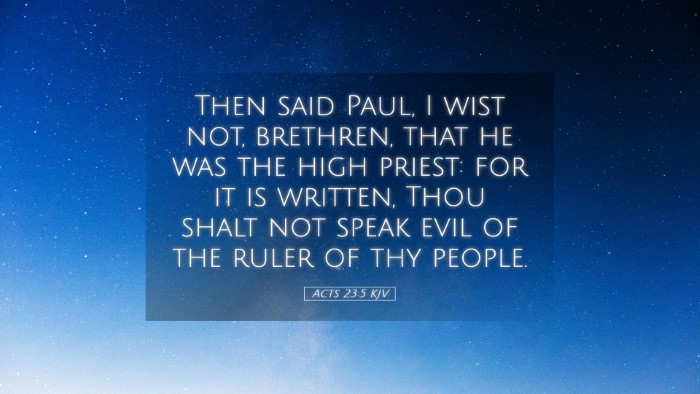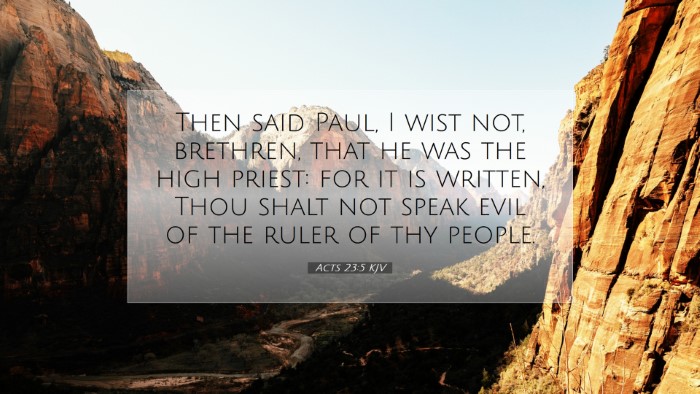Commentary on Acts 23:5
Bible Verse: "Then said Paul, I wist not, brethren, that he was the high priest: for it is written, Thou shalt not speak evil of the ruler of thy people."
Contextual Overview
In Acts 23, the Apostle Paul finds himself before the Sanhedrin, a gathering of religious leaders, to defend his faith and actions. This passage is pivotal as it highlights Paul’s respect for the authority designated by God, even when the leadership is unjust. Understanding this verse involves delving into the political, cultural, and theological implications of Paul's words.
Commentary Insights
Matthew Henry's Commentary
Matthew Henry provides insight into the situation of Paul standing before the Sanhedrin. He points out that Paul's statement reveals his immediate reaction to the high priest’s authoritative command. Henry emphasizes that even though Paul was addressing a corrupt system, he upheld the principle of honoring the high priest, demonstrating his obedience to God’s commandment, which is critical for believers today.
Henry notes that Paul was unaware that Ananias was the high priest, illustrating that he was taken by surprise by the command to be struck on the mouth. This moment highlights the often chaotic and unjust scenarios in which believers may find themselves while maintaining their faith.
Albert Barnes' Commentary
Albert Barnes further expounds on Paul's apology for speaking against the high priest. Barnes explains how this humility and acknowledgment of authority reflects the crucial respect for established leadership, as indicated in the Old Testament. Barnes emphasizes that the reference to Exodus 22:28 profoundly connects the idea of not speaking evil of rulers as a guideline for Christian conduct, encouraging believers to uphold dignity and respect even towards flawed leadership.
He also mentions the implications of such respect and the potential for powerful witness amidst adversity. Paul's reverence is a strong reminder for Christians about maintaining their testimony, regardless of the circumstances they face.
Adam Clarke's Commentary
Adam Clarke provides analytical depth regarding the socio-political dynamics at play. He notes the character of Ananias, describing him as a figure known for his corruption and cruelty. Despite Ananias’ negative reputation, Clarke emphasizes that Paul’s response remained rooted in scriptural principle rather than personal feelings. Paul’s acknowledgment of his ignorance regarding Ananias’s identity serves as a model of accountability and humility, fostering a commitment to biblical principles over personal bias.
Clarke also explores the broader implications of authority and rebellion against it. He underscores a theological understanding that even when rulers are unjust, Christians are called to maintain a posture of reverence and respect as they ultimately serve God above all.
Thematic Reflections
This verse provides a profound reflection on authority, accountability, and the Christian’s responsibility towards it. Several themes arise from Paul's interaction with the Sanhedrin:
- Respect for Authority: The emphasis on showing respect for God’s appointed leaders is foundational. It reminds believers that obedience to God includes honoring those in positions of power, irrespective of their moral standing.
- Humility and Accountability: Paul’s immediate acknowledgment of his error symbolizes a heart willing to be corrected and an example of humility. This humility is vital for all believers as they navigate challenging relationships and leadership contexts.
- The Power of Witness: Paul’s conduct serves as a powerful witness to others in how to respond to injustice. His recognition of the authority stems from a view of God’s sovereignty even in troubling situations.
- God’s Sovereignty: Even amidst political and religious turbulence, God's sovereignty remains intact. Paul’s experience illustrates how believers can trust in God's plan despite human failings.
Conclusion
Acts 23:5 is a rich verse that encapsulates fundamental Christian principles regarding authority, respect, and the demeanor expected from believers. The insights from Matthew Henry, Albert Barnes, and Adam Clarke provide a thorough consideration of these themes. For pastors, students, and theologians, this verse is invaluable in exploring how to uphold Biblical integrity while navigating the complexities of leadership and authority. The call to respect rulers, even when they are imperfect, challenges believers to reflect Christ in every circumstance, which is a testament to the strength of faith in a chaotic world.


